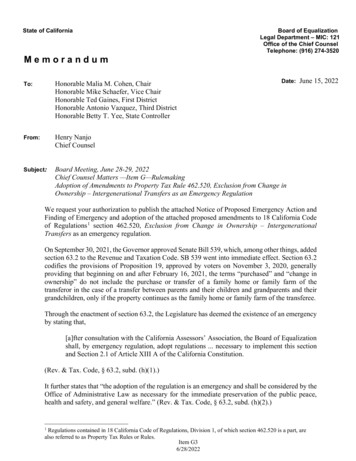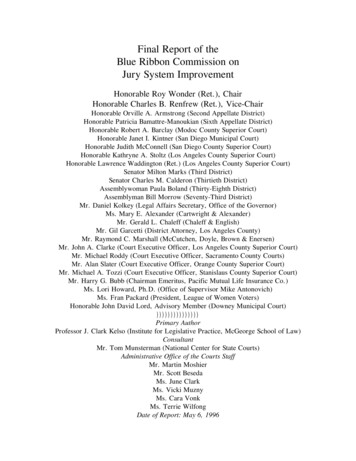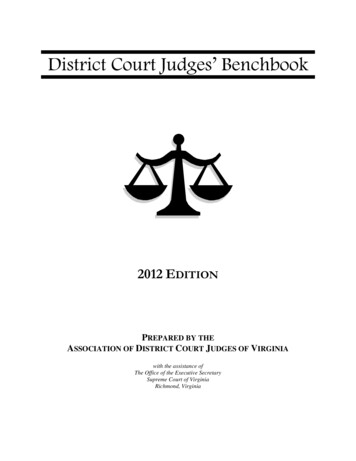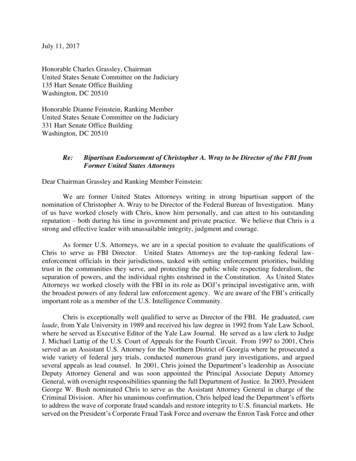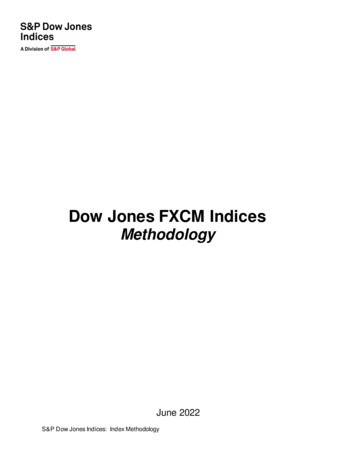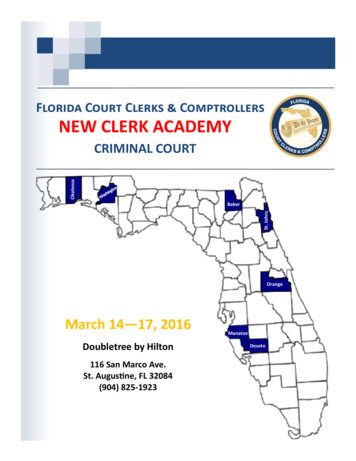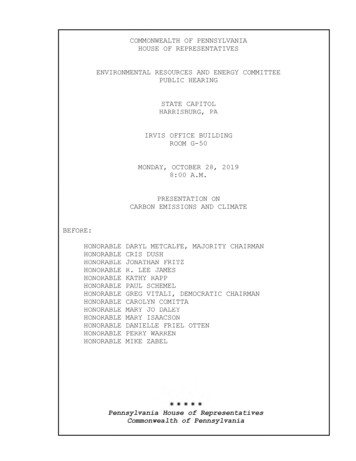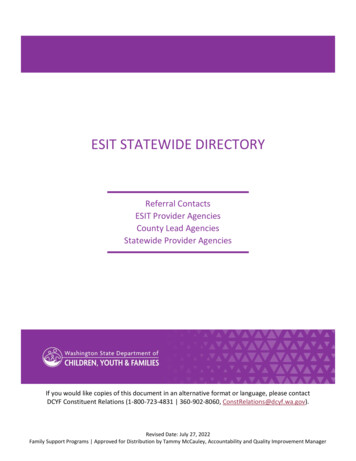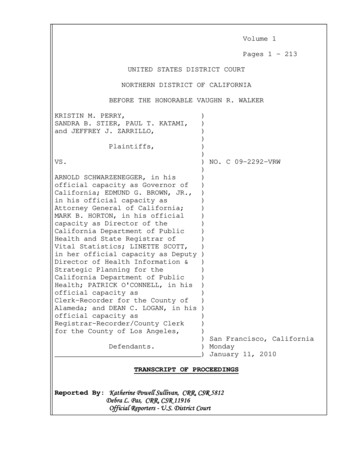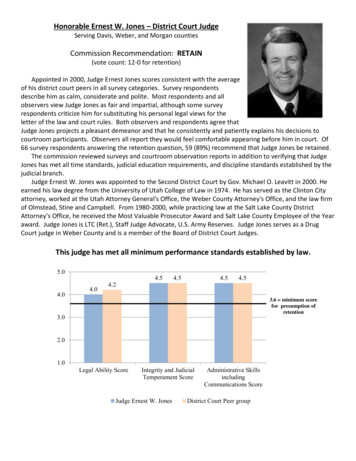
Transcription
Honorable Ernest W. Jones – District Court JudgeServing Davis, Weber, and Morgan countiesCommission Recommendation: RETAIN(vote count: 12-0 for retention)Appointed in 2000, Judge Ernest Jones scores consistent with the averageof his district court peers in all survey categories. Survey respondentsdescribe him as calm, considerate and polite. Most respondents and allobservers view Judge Jones as fair and impartial, although some surveyrespondents criticize him for substituting his personal legal views for theletter of the law and court rules. Both observers and respondents agree thatJudge Jones projects a pleasant demeanor and that he consistently and patiently explains his decisions tocourtroom participants. Observers all report they would feel comfortable appearing before him in court. Of66 survey respondents answering the retention question, 59 (89%) recommend that Judge Jones be retained.The commission reviewed surveys and courtroom observation reports in addition to verifying that JudgeJones has met all time standards, judicial education requirements, and discipline standards established by thejudicial branch.Judge Ernest W. Jones was appointed to the Second District Court by Gov. Michael O. Leavitt in 2000. Heearned his law degree from the University of Utah College of Law in 1974. He has served as the Clinton Cityattorney, worked at the Utah Attorney General's Office, the Weber County Attorney's Office, and the law firmof Olmstead, Stine and Campbell. From 1980-2000, while practicing law at the Salt Lake County DistrictAttorney’s Office, he received the Most Valuable Prosecutor Award and Salt Lake County Employee of the Yearaward. Judge Jones is LTC (Ret.), Staff Judge Advocate, U.S. Army Reserves. Judge Jones serves as a DrugCourt judge in Weber County and is a member of the Board of District Court Judges.This judge has met all minimum performance standards established by law.5.04.04.04.24.54.54.54.53.6 minimum scorefor presumption ofretention3.02.01.0Legal Ability ScoreIntegrity and JudicialTemperament ScoreJudge Ernest W. JonesAdministrative SkillsincludingCommunications ScoreDistrict Court Peer group
The Honorable Ernest W. JonesJudicial Performance Evaluation Commission ReportRetention 2016
Table of ContentsI. Survey ReportSurvey Results . 1A. How to Read the Results . 1B. Retention Question . 2C. Statutory Category Scores . 3D. Procedural Fairness Score . 4E. Responses to Individual Survey Questions . 5F. Adjective Question Summary . 7G. Attorney Demographics . 8Survey Background and Methods . 9A. Survey Overview. 9B. Evaluation Period . 10II. Courtroom Observation Report
I. Survey ReportSurvey ResultsA. How to Read the ResultsFor Judge Ernest W. Jones, 46% of qualified survey respondents submitted surveys. Of those whoresponded, 74 agreed they had worked with Judge Ernest W. Jones enough to evaluate his performance.This report reflects these 74 responses. The survey results are divided into five sections: Statutory category scoresRetention questionProcedural fairness survey scoreResponses to individual survey questionsSummary of adjectivesThe results are shown in both graphs and tables. Each judge’s scores are shown along with a comparisonto other judges who serve at the same court level. The comparison group is called “District Court” on thecharts.The statutory category scores and the procedural fairness survey score represent average scores on a scaleof 1 (inadequate) to 5 (outstanding). Responses from all survey respondent groups contribute to theaverage score shown for each category, with the exception of Legal Ability. Only attorneys answer theLegal Ability questions.What does it take to “pass”? The judge must score a minimum of 3.6 on Legal Ability, Integrity &Judicial Temperament, and Administrative Skills to earn a presumption of retention from theCommission. That is, if a judge scores an average of 3.6 in each of these categories, the commission willvote to recommend retention unless it can articulate a substantial reason for overcoming the presumptionin favor of retention. Similarly, if a judge fails to get a 3.6 in a category, the commission will vote againstretention unless it can articulate a substantial reason for overcoming the presumption against retention.For procedural fairness, the judge must demonstrate that it is more likely than not, based on courtroomobservations and relevant survey responses, that the judge’s conduct in court promotes procedural fairnessfor court participants. Judges will receive either a Pass or Fail in procedural fairness, and thisdetermination will be made by the commission only during the retention cycle.Respondents are asked whether or not they think the judge should be recommended for retention onlyduring the retention cycle.Judge Ernest W. Jones - 2016 Retention - 1
B. Retention QuestionFigure A. Would you recommend that Judge Ernest W. Jones be retained?100%89%80%60%40%20%0%11%YesNoJudge Ernest W. Jones - 2016 Retention - 2
C. Statutory Category ScoresFigure B. Statutory Category Scores5.04.04.04.54.24.54.54.53.6 minimum scorefor presumption ofretention3.02.01.0Legal Ability ScoreIntegrity and JudicialTemperament ScoreJudge Ernest W. JonesAdministrative SkillsincludingCommunications ScoreDistrict Court Peer groupRated on a scale from 1 (inadequate) to 5 (outstanding)Judge Ernest W. Jones - 2016 Retention - 3
D. Procedural Fairness ScoreFigure C. Procedural Fairness Score5.04.54.54.03.02.01.0Procedural Fairness ScoreJudge Ernest W. JonesDistrict Court Peer groupRated on a scale from 1 (inadequate) to 5 (outstanding)For procedural fairness, the judge must demonstrate by a preponderance of the evidence that thejudge’s conduct in court promotes procedural fairness for court participants. This determinationis based on courtroom observations and relevant survey responses.Table A. Overall Procedural Fairness Determination (for Retention Only)CategoryProcedural FairnessJudge Ernest W. JonesPassJudge Ernest W. Jones - 2016 Retention - 4
E. Responses to Individual Survey QuestionsTable B. Responses to Survey QuestionsCategoryQuestionJudge Ernest W. JonesDistrict CourtLegal AbilityThe judge follows the applicable legal rules (e.g.civil procedure, criminal procedure, evidence,juvenile, appellate) that apply to the case at issue.4.14.2Legal AbilityThe judge makes appropriate findings of fact andapplies the law to those facts.4.14.2Legal AbilityThe judge follows legal precedent or clearly explainsdepartures from precedent.4.04.2Legal AbilityThe judge only considers evidence in the record.4.14.2Legal AbilityThe judge’s written opinions/decisions offermeaningful legal analysis.4.04.2Legal AbilityThe judge’s written opinions contain a readilyunderstandable, concise ruling4.14.2Integrity & Judicial The judge makes sure that everyone’s behavior inTemperamentthe courtroom is proper.4.64.6Integrity & Judicial The judge appears to pay attention to what goes onTemperamentin court.4.64.6Integrity & Judicial The judge’s personal life or beliefs do not impair hisTemperamentor her judicial performance.4.24.3Integrity & Judicial The judge demonstrates respect for the time andTemperamentexpense of those attending court.4.64.4The judge promotes access to the justice system forIntegrity & Judicialpeople who speak a language other than English, orTemperamentfor people who have a physical or mental limitation.4.64.6Rated on a scale from 1 (inadequate) to 5 (outstanding)Judge Ernest W. Jones - 2016 Retention - 5
Table C. Responses to Survey Questions (continued)CategoryQuestionJudge Ernest W. JonesDistrict Court4.54.44.64.6Administrative Skills The judge is an effective manager.4.54.5Administrative Skills The judge convenes court without undue delay.4.64.6Administrative Skills The judge rules in a timely fashion.4.54.5Administrative Skills The judge maintains diligent work habits.4.64.5Administrative Skills The judge’s oral communications are clear.4.54.5Administrative Skills The judge is prepared for court proceedings.Administrative SkillsThe judge’s interactions with courtroom participantsand staff are professional and constructive.Administrative SkillsThe judge’s written opinions/decisions are clear andlogical.4.34.3Procedural FairnessThe judge treats all courtroom participants withequal respect.4.54.64.44.5Procedural Fairness The judge is fair and impartial.Procedural FairnessThe judge promotes public trust and confidence inthe courts through his or her conduct.4.54.5Procedural FairnessThe judge provides the parties with a meaningfulopportunity to be heard.4.64.4Rated on a scale from 1 (inadequate) to 5 (outstanding)Judge Ernest W. Jones - 2016 Retention - 6
F. Adjective Question SummaryFrom a provided list, survey respondents selected multiple adjectives to best describe the judge. The“positive” and “negative” labels at the top of the graph refer to the percent of all adjectives selected by allrespondents that were either positive or negative. Each bar is based on the percent of respondents whoselected that adjective. The adjacent bar shows a comparison to the other evaluated judges who serve onthe same court level.Figure D. Adjective ResponsesPositive:93% of all adjectives selectedNegative:7% of all adjectives lippantImpatientIndecisiveRudeBars based on %of respondentsselecting eachadjectiveJudge Ernest W. JonesDistrict Court Peer AverageJudge Ernest W. Jones - 2016 Retention - 7
G. Attorney DemographicsTable D: What are your primary areas of 68%Other7%Because many attorneys practice in multiple areas, totals may not equal 100%Table E: How many trials or hearings have you had with this judge over the past year?5 or fewer68%6 - 1020%11 - 155%16 - 202%More than 205%Judge Ernest W. Jones - 2016 Retention - 8
Survey Background and MethodsThis report presents the results from the 2015 survey process, conducted by Market Decisions, LLC. Adetailed description of the survey methodology is available separately on the Utah Judicial PerformanceEvaluation website.A. Survey Overview1. Description of SampleThe following groups are invited to participate in the survey process: Attorneys with appearances before the judgeCourt staff who work with the judgeJuvenile court professionals who work in the judge’s courtroom on a regular and continuing basisto provide substantive input to the judge (juvenile court judges only)Jurors who participate in jury deliberation (district and justice court judges only)With the exception of the attorney survey, the survey contractor attempts to survey all court staff andjuvenile court professionals who work with the judge and all jurors who reach the point of jurydeliberation. The lists of court staff and juvenile court professionals are provided by the courts and by theDivision of Child and Family Services and Juvenile Justice Services. A list of jurors is created after eachtrial. All lists are forwarded to the surveyor, Market Decisions, LLC.For the attorney survey, a representative sample of attorneys is drawn to evaluate each judge based onappearances over a designated time period. The sample is weighted to select those with the greatestexperience before the judge, assuming that these people will have a better knowledge base about thejudge than those with less experience. Attorneys are first stratified into three groups: those with one ormore trial appearances, those with three or more non-trial appearances, and those with one to two nontrial appearances. Attorneys within each sample are then randomized prior to selection. Selection beginswith attorneys who have trial experience, then those with a greater number of non-trial appearances (ifneeded), and finally those with fewer non-trial appearances (if needed).2. Summary of Survey MethodsSurveys are conducted online, using web-based survey software. Each qualified respondent receives aninitial email notification signed by the Governor, Chief Justice, President of the Senate, and Speaker ofthe House, requesting participation in the survey. Next, an email invitation, signed by JPEC’s ExecutiveDirector and the Utah State Bar President, contains links to all the individual surveys each respondent isinvited to complete. A reminder email is sent one week later to those who did not respond by completingand submitting a survey. This is followed by two additional reminder emails sent to respondents over thenext three weeks. If a respondent completes only part of the survey, he or she is able to finish the surveyat a later time. Once a respondent has completed the survey for a specific judge, that survey is locked andcannot be accessed again.Judge Ernest W. Jones - 2016 Retention - 9
The number of questions included in the survey varies, ranging from 9 (jurors) to 24 (attorneys with anappearance before an appellate court judge). Each question is evaluated on a sliding scale ranging from 1(inadequate) to 5 (outstanding).Responses to individual questions are used to calculate averaged scores in three statutory categories:Legal Ability, Integrity & Judicial Temperament, and Administrative Skills. Judges also receive anaveraged score in Procedural Fairness.B. Evaluation PeriodThe retention evaluation period for judges standing for election in 2016 began on January 1, 2014 andended on June 30, 2015.Judge Ernest W. Jones - 2016 Retention - 10
REPORT OF COURTROOM OBSERVATIONS FOR JUDGE ERNIE JONESFour observers wrote 86 codable units that were relevant to 13 of the 15 criteria. One observer reported that thejudge was aware that JPEC observers were present, one observer reported that the judge was not aware, and two didnot know if the judge was aware.OverviewOVERALLASSESSMENT All observers were positive about Judge Jones. All observers reported that they would feel comfortable appearing before Judge Jones.WIDELYAGREED-UPONTHEMES All observers variously reported that Judge Jones was well-prepared and knowledgeableabout his cases. He greeted participants using Sir or Madam, and he wished participantsgood luck as they left. He was polite and courteous even when delivering strict sentences.His demeanor was calm, easy-going, and non-threatening, with the right mix of toughnessand concern for participants’ feelings, as appropriate. He made frequent eye contact andspoke in a calm tone without raising his voice. He consistently applied a standard procedurewith every defendant. While he acted in the interests of both sides, he showed individualconsideration by handling different situations differently, wishing to help first offenders andthose with special situations, but showing much less permissiveness with repeat offenders.He generally allowed defendants to speak for themselves and asked all participants if theyhad anything to add, and he was skilled in his questioning methods. He always asked ifinformation was understood and provided time for questions, patiently explaining anythingthat might be confusing and clearly explaining the reasons for his decisions. Observers variously reported that Judge Jones’ body language was generally neutral, butthey reported two cases in which his disinterested or impatient body language wasunderstandable or appropriate (see “Body language”) .MINORITYOBSERVATIONS Three observers found the courtroom staff helpful and efficient, while another reported thatsome were not very “customer service” oriented (see “Courtroom tone & atmosphere”) . Two observers reported that it was difficult to hear the proceedings and the amplificationneeded to be turned up (see “Courtroom tone & atmosphere”) .ANOMALOUSCOMMENTS NoneSummary and exemplar language of four observers’ commentsRESPECTWell-prepared& efficientAll observers reported that Judge Jones seemed well-prepared and quite knowledgeable about thecases. He took time to review the cases before proceeding and had all paper documents beforehim without needing to use his computer.Respect forothers’ timeOne observer reported that Judge Jones was very flexible in scheduling and in accommodating allrequests for a change or a delay.Courtesy,politeness, andgeneraldemeanorAll observers variously reported that Judge Jones entered the courtroom smiling, greetingeveryone with Sir/Madam in a pleasant voice. He treated participants politely and waited patientlyfor answers, and he was courteous even when delivering a strict sentence. His demeanor wascalm, easy-going, non-threatening, and “fatherly,” with a good sense of humor very occasionallyused, such as laughing at the irony of starting payments for a former IRS employee on April 15.Judge Ernest W. Jones - 2016 Retention - 11
Courtesy,politeness, andgeneraldemeanorcontinuedJudge Jones displayed the right mix of toughness and concern for victims, and he showedsympathy for a young couple who had lost a baby with questions that expressed his concern andsorrow. When some questions made a woman uncomfortable, such as, “You’re not a sexoffender?” the judge stopped and said, “I don’t mean to embarrass you but these are all requiredby statue.” He congratulated a woman gaining guardianship of her grand-niece, saying, “I’mimpressed you are stepping up to take this responsibility, most people wouldn’t – this isn’t easy.”He wished people a sincere “Good luck” as they left the courtroom.Judge Jones gave defendants the opportunity to question anything, except on two occasions whenhe asked the defending attorney if his client understood something as opposed to asking thedefendant.Body languageAll observers reported that Judge Jones smiled and made a lot of eye contact with speakers.One observer reported that Judge Jones’ body language was neutral but not disinterested. Twoothers reported that any disinterested or impatient body language was understandable orappropriate. In one case the judge explained patiently to a tearful and apologetic young womanhow she should change her behavior if she really wanted to be free, and while he failed to look upfrom his notes while she pleaded to be free to help her mother, and his body language showed alack of interest in her plea, this became a little more understandable when he explained theseverity and repetitive nature of her crimes. In another case he displayed appropriate voice andbody language when he leaned forward and became upset and lost patience with a defendant whohad not reported to jail after being granted an extra week by Judge Jones to get his personal life inorder and was currently on his fourth attorney.Voice qualityTwo observers reported that Judge Jones did not raise his voice, which was very calming andsmooth.Courtroom tone& atmosphereThree observers reported that the staff were alert, helpful, and efficient, and the court ransmoothly with no delays or problems. However, one observer reported in contrast that some of thecourtroom staff were not very “customer service” oriented. The prosecutor would not give adefendant the phone number for AP&P, saying after some argument that he didn’t have time forthis. In another instance a bailiff who had been talking, smiling and gesturing during theproceedings which the observer had found concerning and distracting, later removed a womanfor talking too loudly without giving her an initial warning.Two observers reported that the speakers needed to be turned up as it was sometimes difficult tohear even in the front row. The door was continuously opening and closing which was distracting.NEUTRALITYConsistent andequal treatmentTwo observers reported that Judge Jones consistently applied the same routine of seekinginformation, reading the charges, and asking, “Is that what you did?” and if defendants werepleading guilty he asked, “Did you read the statement of your rights. Do you understand theserights? Do you have any questions?” He acted in the interests of both the state and the defendant,in one case saying, “I agree with [defendant] that this is not the most serious thing thathappened,” sentencing him to 180 days jail with work release when the defense requestedprobation with work release and the prosecutor wanted 365 days in jail with no work release.Demonstratesconcern forindividualneedsThree observers reported that Judge Jones showed his consideration by handling differentsituations differently. When a young man who suffered from chronic pain was charged withforging a prescription, the judge said, “This is a tough situation to be in, but it is against the lawto forge prescriptions,” and referred him to substance abuse treatment rather than jail. He wasmore lenient with first time offenders and responded to criticism from one attorney by saying,“The purpose here is to help her.” He explained the maximum sentence to an overwhelmeddefendant who had said he didn’t need an attorney and was ready to plead guilty, informed himof the process of appointing a public defender, and said that he would reschedule the case so thedefendant could meet with the defender.Judge Ernest W. Jones - 2016 Retention - 12
Demonstratesconcern forindividualneedscontinuedHowever Judge Jones did not hesitate to be less permissive with repeat offenders, questioning asentencing recommendation by asking, “Why is a third-time retail theft offender not receiving ajail sentence?” He tried to get repeat offenders to see that their actions were counter productive,saying, “Where do you see yourself in 10 years? You have got to start thinking.You are the onlyone who can do something besides sit in a jail cell.good luck to you.”Unhurried andcarefulOne observer reported that Judge Jones moved through the proceedings carefully but efficientlywithout rushing anyone, lawyers or participants.VOICEConsideredvoiceAll observers reported that Judge Jones allowed defendants to speak for themselves and askedboth sides’ attorneys or the defendant if they had anything further to say, asking, “Anything else.is there something else you wish to add?” He allowed time after questions for responses, and tookthe time to listen to the responses. He adopted more effective methods of allowing participants tovoice their own opinions than a more confrontational approach, and he was skilled at notallowing evasive answers. He asked one defendant to please explain his attitude.COMMUNICATIONCommunicatesclearlyTwo observers reported that Judge Jones spoke calmly and clearly, explained terms likeconcurrent and consecutive, and was very clear when stating his decisions and expectations.EnsuresinformationunderstoodThree observers reported that Judge Jones always asked if information was understood, asking,“Do you understand?” or, “Are you under pressure? ” And provided time for questions andfurther explanation. After explaining the proceedings, such as the difference between courtprobation and formal probation, he asked if it was understood.ProvidesadequateexplanationsThree observers reported that Judge Jones patiently explained anything that might be confusingand the reasons for his decisions, in one case clearly explaining why he did not agree with therecommendations because of the seriousness of the offense that involved a gun and drugs and twopervious convictions for violent crimes. He explained clearly why repeat offenders were receivingsentences for continued jail time, saying, “Mr. A, you make it so hard for [law enforcement]. Ifyou can’t do drug court, there is no other program out there.there is a 3-5 year sentence outthere. you have been to prison before, you know what it is like.” He took the time to explain whyhe would not expunge a charge because there had been multiple crimes committed after thecrime.Judge Ernest W. Jones - 2016 Retention - 13
Attorney's Office, he received the Most Valuable Prosecutor Award and Salt Lake County Employee of the Year award. Judge Jones is LTC (Ret.), Staff Judge Advocate, U.S. Army Reserves. Judge Jones serves as a Drug Court judge in Weber County and is a member of the Board of District Court Judges.
